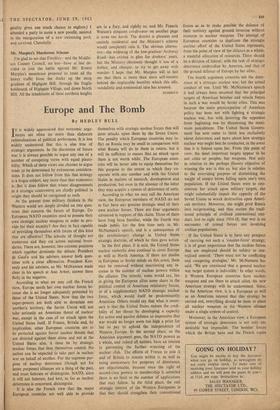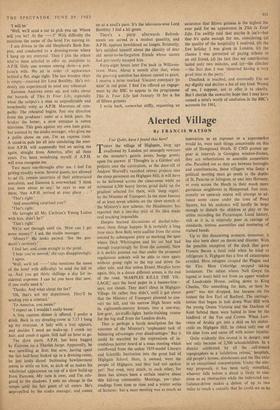The two men who made the film—one already a documentary-maker,
the other a writer—tried
The Penguin African Library
The first four volumes:
African Profiles Ronald Segal 6s A Short History of Africa Roland Oliver and J. D. Fage 5s Portugal in Africa James Duffy 4s 6d The Arab Role in Africa Jacques Baulin 3s 6d 'Penguin's ... breaking new ground in politics on a scale unmatched since their spate of Penguin Specials on the eve of the last war'— Financial Times Designed to meet the needs of today's serious newspaper reader, this new series will explore what goes on behind the headlines and embassy hand-outs: it will present a complete, authoritative picture of the nations and peoples which now play a major part in world affairs.
Published this month by Penguin Books The leading personalities who are making Africa what it is today.
The overall story from earliest times to the recent Pan-African conferences by two eminent African scholars.
The background to one of the world's trouble spots by the foremost authority on Portuguese colonialism.
The first concise survey of the political interplay between Arabs and Africans south of the Sahara.
Write to Penguin Books Ltd, Harmondsworth, Middlesex for a complete list of books now available. of the time not far off it. It's a pity that, in making a kind of anthropological survey on film, they stuck to such a narrow and thoroughly beaten track.
Television
Drama Department
By CLIFFORD HANLEY
THERE'S always something a bit suspicious about big prestige projects. Member of the Family (BBC) is an interest- ing example. It had both Eartha Kitt and Richard Todd, clearly big-time stuff; also an interesting situation—inter- racial marriage among the plutocrats, for a change. Miss Kitt still contrived to exude the fascination of an immensely cultured cobra.
Everybody else (and even she, much of the time) behaved as in a dream. Maybe the upper-crust milieu had them overawed. The production adopted the measured pace of a Chinese opera.
Then it started to turn into a heavily mechani- cal suspicion-of-murder drama, in which every innocent circumstance conspired to trap the inno- cent negro wife. The dream quality persisted, but it was one of those dreams you know aren't true even while you're dreaming. Pity.
Still, the drama departments are trying, and deserve our thanks. There was also David Mercer's Climate of Fear for which the BBC de- serves a pat. It does take some degree of liberal tolerance to mount a play in which the CND types take the more or less heroic roles. Lots of interesting stuff here, and the characters were written with love and passion all right, but they soon turned out to be overloaded to the point of collapse. There may well be people who are so dedicated that they keep it up round the clock without ever pausing for a bit of fun, but I flee from such people in real life and I doze over them on the screen. It suddenly came ablaze at the end, with the well-bred mother descending into mumbling claustrophobic horror in a Black Maria, after joining her rebel kids in a sit-down demonstration; a lacerating commentary on every civilised society's passion for locking up human beings in small spaces.
Mr. Mercer has plenty to say, and I look forward to his next statement, in which no doubt he will ignore criticism and bash straight on. I mention this point because I've been puzzled by the critical reception given to Leo Lehman's lightweight common-room romp I Don't Like You (1TV) last week. Several English commen- tators whom I respect have lambasted the
L
W. H. ALLEN
PUBLISHERS SINCE THE 10TH CENTURY
Just Out
SPIRIT LAKE
The superb new story by MacKINLAY KANTOR, whose previous book Anderson- vine won the Pulitzer Prize. The great novel of the American frontier, it is an epic story, providing magnificent holiday reading.
960 pages 30s
ILKA CHASE
In THE CARTHAGINIAN ROSE, the author of In Bed We Cry writes entertainingly of her world travels, the fascinating places she visited and the interesting people she met.
Illustrated by Vasiliu 25s
A. J. LIEBLING
This famous New Yorker writer has found a subject dear to his heart in the eccentric Governor Earl Long. THE EARL OF LOUISIANA is an hilarious biography, yet charged with drama. " A brilliant book, rapturously funny " — DOM MORASS, DAILY EXPRESS. 2Is
TERESKA TORRES
In THE ONLY REASON the author is back in the mood of The Dangerous Games. It is a luminous, haunting novel of seven
restless pleasure-seekers in Paris. I3s 6d July
PETER DE POLNAY
THE FLAMES OF ART finds the author In his favourite city — Paris — for this unforgettable story of a woman painter-
genius. les
August'
PHYLLIS BRETT YOUNG
The latest novel by the Canadian author of Psyche, THE GIFT OF TIME, is a deep and penetrating analysis of the contemporary
social scene. 16s
ALICE WALWORTH GRAHAM
Her new novel, CIBOLA, is a story of the days in the old South when cotton was king. It gives an authentic picture of a river plantation with its haunting beauty and loneliness. les
PHILIP FREUND
Four psychological suspense tales by one of today's most distinguished writers are con- tained In THE DEVIOUS WAYS. Virtually four short novels in one volume. I5s
September
RICHARD M. NIXON
In SIX CRISES the former Vice President of the United States tells the stories of the
six major crises of his political career. 35s
r. PUBLISHERS SINCE THE 19TH CENTURY W . H. ALLEN by punishing or casting out the artists who have attempted thus to fill the religious gap, and not by showing them the error of their thought. How could they, when their own ways were at least equally erroneous? Hatred and fear of human and animal love is a far worse substitute for the love of God than excessive love of man. The last hundred years are punctuated by repeated attacks made by society upon artists who have, to a greater or lesser extent, accepted the same fallacy as Wilde. A series of literary scandals has marked this progressive substitution of carnal for divine love: Byron, Flaubert, Baudelaire, Ibsen, Verlaine, Hardy, Wilde, Norman Doug- las, D. H. Lawrence, James Joyce, Henry Miller. It would be wrong to think that Wilde, who in most ways had so little in common with those others, found himself in this list by mistake. He was there quite deliberately. What he called his 'hedonism'—which in Victorian parlance means little more than the substitution of the pleasure principle for the love principle—led him directly to his dramatic and self-dramatised fate. Djilas's account is almost identical: he speaks of the troops' movement as part of 'an agreement between the Yugoslav and Albanian govern- ments.'
This incident is certainly the most sensitive thing in the book from Belgrade's point of view. But Djilas also reveals, in his description of the suicide of Naku Spiru, that a strong and 'honest' element in the Albanian party was entirely op- posed to all Yugoslav penetration. In effect, while Djilas himself is more opposed to Hoxha's present Stalinism than anyone, his regard for truth is so great that he supports the Albanian version of the trouble between the parties in 1947- 48. Strictly speaking, he does not do so by men- tioning new facts, let alone secret ones; but his virtual acceptance of the anti-Yugoslav story, coming from one who was very much in a posi- tion to know, is an unpleasant blow to those in Belgrade who may still think that history is 'politics projected back into the past.'

































 Previous page
Previous page